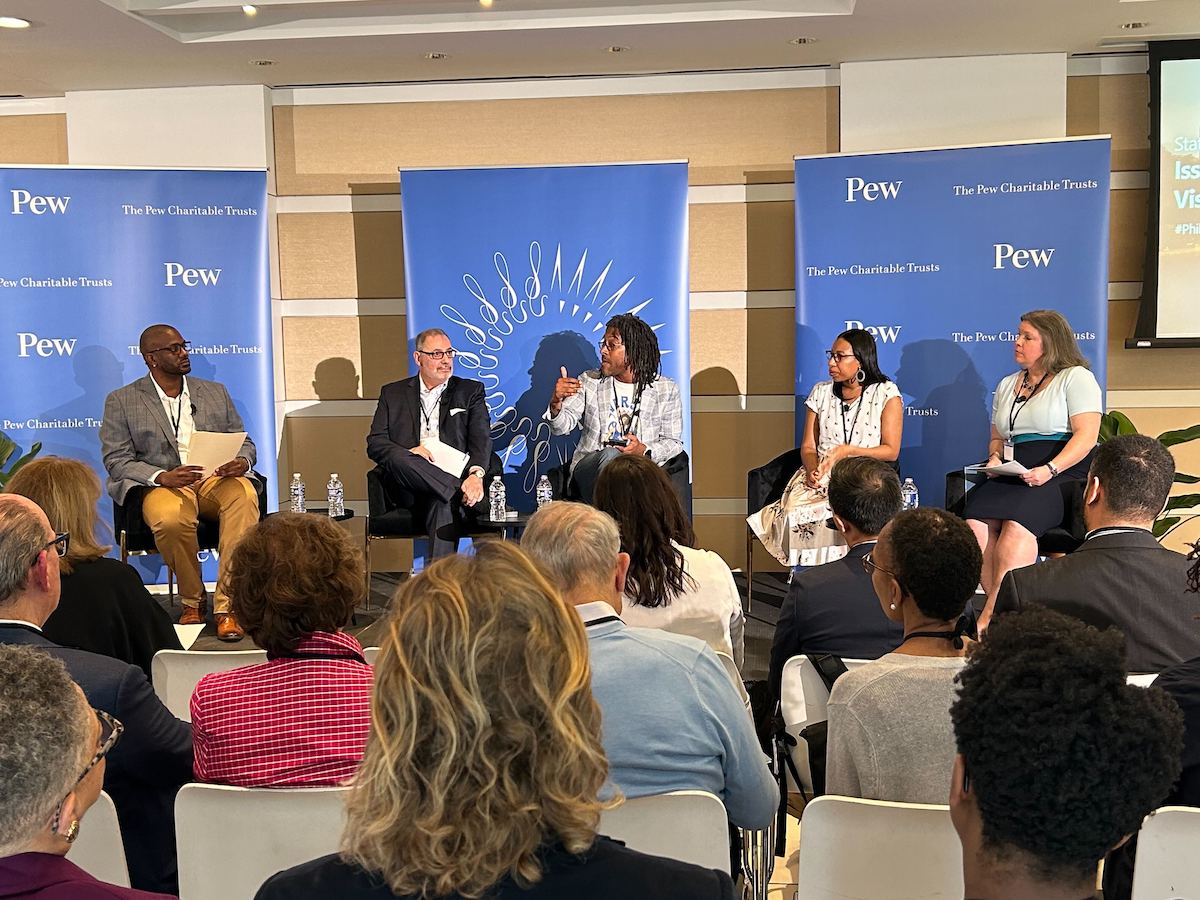This thought process calls on the days of old world, intricate buildings. The masons building the bases of these iconic structures likely wouldn’t be there when the finishing touches were added decades later. But they worked hard on a steady foundation anyway.
The long-term thinking strategy was discussed at Pew Charitable Trusts‘ annual State of the City event Wednesday, the same day the organization released its 2023 report looking at the current state of Philadelphia many facets like housing, health, gun violence, politics, employment and the economy.
The event was a partnership between Pew and the Lenfest Institute for Journalism, which has been funding some outreach asking everyday Philadelphians about their outlook on the city. The Philadelphia Inquirer journalists Julia Terruso and Aseem Shukla explained at the event that a survey conducted by Lenfest and research firm SSRS found that a majority of Philadelphians — about two thirds of respondents — feel the city is “not on the right track.” They compared it to similar polling done before the pandemic which revealed about half of Philadelphians felt that way at the time.
Crime was the most-cited priority by all respondents, with about half of all respondents saying they’ve seen gun violence play a direct impact on their life. Residents also cited the cost of living, housing, jobs and city services as their priorities, the reporters said. And although the polls revealed a generally pessimistic take from residents, the outreach showed they want solutions-based responses to these problems, including funding for mental health programs, education, healthcare and addiction issues.
“People want a more nuanced and systematic approach to solving these things,” Terruso said.
A human capital crisis
Nuance was all over the next portion of the night, as Michael O’Bryan, founder of Humanature and distinguished resident fellow at the Lindy Institute for Urban Innovation at Drexel University, led a panel discussion between researchers and practicers in nonprofits, healthcare, business and academia.
All agreed that there is an ongoing human capital crisis in the US, and in Philadelphia. They also agreed that the issues Philadelphians noted as their top concerns — crime, addiction, homelessness and others — stem back to lack of access to livable wages, functioning schools and healthcare to keep them progressing.
Wil Reynolds, founder and CEO of digital marketing agency Seer Interactive, has made some choices to counterbalance some of these “divides in our businesses.” For one, he’s brought on janitorial and support staff — roles that are usually contracted out and paid minimum wage — to his team as employees, with base salaries of $65,000 and full benefits, he said.
Businesses face systemic challenges throughout the city, Reynolds said. He feels Philadelphia’s tax code has made it more expensive to grow businesses here. And he called out that no matter what he does to support his full time employees, as they grow their families, the Philadelphia school system becomes their number-one concern. (Yes, we’ve heard this before.)
If they were in charge
When prompted for what changes he’d mandate if he were in top city leadership, Reynolds called out the education system. His concerns were echoed by Akira Drake Rodriguez, an assistant professor at the Weitzman School of Design at the University of Pennsylvania. Infrastructure problems, lack of teachers and racial divides have made schools no longer the centers of communities, she said.
“If we invest in schools, we can bring people back into the schools, we can bring the teachers, we can bring their students, we can bring everyone in and really think about schools as these critical sites of community infrastructure,” Rodriguez said.
Rev. Luis Cortés Jr., CEO of faith-based nonprofit Esperanza, said he’d work toward establishing historic cultural communities that serve differing populations in Philadephia, and he’d work on a root of a lot of Philadelphia’s issues, affordable housing.
And Adriana Torres-O’Connor, president and CEO of Mental Health Partnerships, said her mandate would revolve around instilling mental healthcare in schools and striking down many of the degree requirements related to providing mental health services.
Silver linings
While looking at statistics from Pew’s State of the City report, there are some silver linings. The unemployment rate is at 5.9% in 2022, and Philadelphia saw 6.7% job growth last year — more than 2% more than the overall United States’ 4.3%. Philly’s education and health sector continued to grow, employing more than 225,000 people, and its hospitality sector is bouncing back.
But one in 10 Philadelphians are still live in deep poverty, and its gun violence, opioid use and education system are faltering under pressure. With some long-term work and investments now, the future could be brighter, O’Bryan said.
“Cathedral thinking serves as a reminder to prioritize long-term benefits and legacies over short-term gains,” he said, “and to foster a sense of shared responsibility for creating a better future.”
Watch the full event here:







